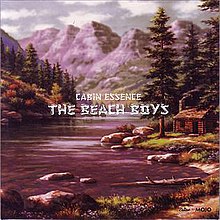| "Cabinessence" | |
|---|---|
 2011 Mojo single cover | |
| Song by the Beach Boys | |
| from the album 20/20 | |
| Released | February 10, 1969 |
| Recorded | October 3, 1966 – November 20, 1968 |
| Studio | Gold Star, Western, Columbia, and Capitol, Hollywood |
| Length | 3:34 |
| Label | Capitol |
| Songwriter(s) | |
| Producer(s) | The Beach Boys |
| Licensed audio | |
| "Cabinessence" on YouTube | |
| Audio sample | |
"Cabinessence" (also typeset as "Cabin Essence") is a song by the American rock band the Beach Boys from their 1969 album 20/20 and their unfinished Smile project. Written by Brian Wilson and Van Dyke Parks, Wilson described the song as a "rock and roll waltz" about railroads, while Parks offered that the pair were attempting to write a song that would end on "a freeze frame of the Union Pacific Railroad". The instrumentation includes banjo, cello, dobro, bouzouki, fuzz bass, trumpet, accordion, and percussion that was arranged to sound like the pounding of rail spikes.
During the initial recording for the song, in late 1966, Parks was called in to the studio to settle a dispute from Mike Love over the lyrics, which Love felt may have contained references to drug culture, something he did not wish to be associated with. Although Parks refused to explain the song to Love, he sang the lines despite his reservations. Parks subsequently disassociated himself from the project, leaving "Cabinessence" unfinished until November 1968, when Wilson's bandmates overdubbed additional vocals onto the recording. It was then included as the closing track on 20/20. Wilson later remade "Cabinessence" as a solo artist for his 2004 album Brian Wilson Presents Smile, presented with the original intended name "Cabin Essence".
"Cabinessence" remains one of the central pieces of the Smile mythos. In 2011, Mojo issued "Cabinessence" as a single, backed with "Wonderful", to promote the forthcoming release of The Smile Sessions.[not verified in body] In 2012, the magazine ranked it the 11th-greatest Beach Boys song, deeming it "Smile in microcosm" and a "misunderstood masterpiece". Biographer Jon Stebbins said that its "demonic chanting" exemplified "some of the most haunting, manic, evil-sounding music the Beach Boys ever made".
